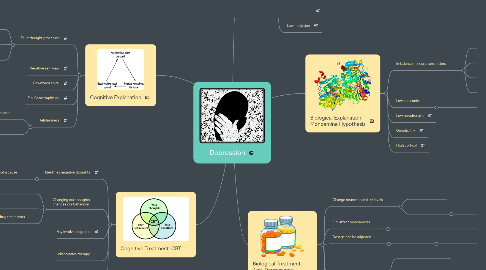
1. Cognitive Explanation
1.1. Fault thought processes
1.1.1. CBT effective
1.1.2. Symptom not cause?
1.1.3. Supporting evidence in teenagers
1.2. Negative self-view
1.3. Downward spiral
1.4. E.g. Catastraphising
1.5. Helplessness
1.5.1. Seligman's Animal Research
1.5.2. Supporting evidence
2. Cognitive Treatment: CBT
2.1. Identifies negative thoughts
2.1.1. May be a symptom, not a cause
2.2. Changing out thoughts changes our behaviour
2.2.1. No better than other therapies?
2.2.2. Cognitive-restructuring successful
2.2.3. Effective alongside drug treamtents
2.3. May involve diagrams
2.4. Collaborative therapy
2.4.1. Long-lasting change
2.4.2. Not suitable for everyone
2.5. Once a week for 5-20 weeks
3. Symptoms
3.1. Intense sadness/guilt
3.2. Lack of enjoyment
3.3. Sleep problems
3.4. Low motivtion
4. Biological Explanation: Monoamine Hypothesis
4.1. Imbalance in neurotransmitters
4.1.1. Antidepressants effective
4.1.2. Only 50% success rate
4.1.3. Correlational evidence
4.1.4. Could be ANY neurotransmitters!
4.2. Low serotonin
4.2.1. Placebos often as effective as SSRIs
4.3. Low noradrenalin
4.4. Genetic link
4.5. High cortisol
5. Biological Treatment: Anti-Depressants
5.1. Change neurotransmitter levels
5.1.1. Side effects
5.1.2. Fast-acting
5.1.2.1. But still take a while to work...
5.2. E.g. affect monoamines
5.2.1. ECT may be better for extreme cases?
5.3. Dosage can be adjusted
5.3.1. Addictive
5.3.1.1. Withdrawal effetcs
5.4. Available on perscrption
5.4.1. Enable day-to-day life
5.4.2. Can be taken during pregnancy?
5.4.3. Relies on patient taking
5.5. Patient can try different types
5.5.1. Treats symptoms, not cause

